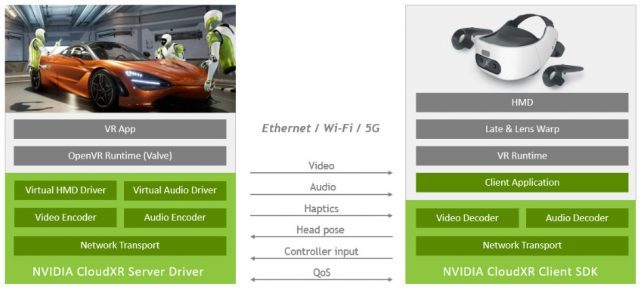NVIDIA today announced the launch of version 1.0 of its CloudXR SDK, a suite of tools which allows network operators to offer cloud-rendered AR/VR streaming capabilities.
Nvidia has been steadily readying its CloudXR system in preparation for the proliferation of GPU-equipped edge computing networks and 5G connected devices. The company has created a suite of tools which will allow such networks (or operators atop those networks) to offer cloud-rendered AR/VR content to their customers.
The hope of AR/VR streaming is to remove VR’s high-end hardware barrier by rendering the visuals in the cloud and streaming them to a host device which itself doesn’t need particularly beefy or expensive hardware. Nvidia already offers a very similar service called GeForce Now, but it’s for traditional games rather than VR. CloudXR is a specialized solution for the unique latency and performance requirements of VR and AR streaming.
While Nvidia had announced the early access launch of the CloudXR SDK late last year, today the company says it’s launching the 1.0 version, which is ostensibly ready for initial deployments into real networks.
Nvidia says the CloudXR system can stream any SteamVR content to end users on Windows or Android systems without any special modification to the streamed application. That could be game and entertainment content or enterprise and productivity content like high-end 3D visualization or immersive design applications; whatever the operator wants to offer to its customers.

But the CloudXR SDK isn’t just a simple host-client video encoder/decoder; Nvidia says the system is architected to run and be managed across large server deployments, offering a truly scalable solution that can support many simultaneous customers across virtualized hardware.
CloudXR combines the performance of RTX Server with NVIDIA’s GPU virtualization software, the Quadro Virtual Workstation (Quadro vDWS), to securely enable multi-tenant deployments, a common requirement among telecommunications (telco) and service providers. GPU virtualization also allows multiple virtual machines to access a GPU when the workload is lighter, optimizing for user density and operating costs. Manageability is streamlined with support for both VMware and Red Hat virtualization platforms and supporting management tools.
For edge computing operators that want a complete solution, Nvidia is even offering an ‘RTX Server CloudXR 5G MEC DevKit’—literally a server box with all the necessary hardware and software for cloud-rendered AR/VR streaming that can be plugged into an existing data center for testing.
It’ll be some time yet until we could see CloudXR streaming capabilities offered to real end-users, but Nvidia hopes this is an important first step to enabling a future of viable AR/VR cloud streaming.







